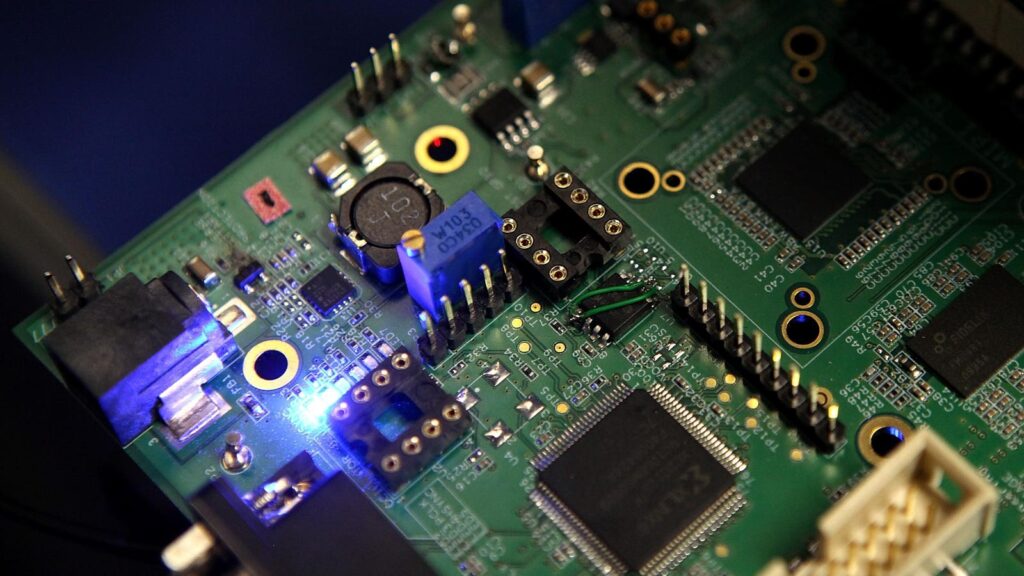Top Line
Semiconductor stocks rose on Wednesday on reports that the United States would exempt allies such as Japan and the Netherlands from expected trade restrictions on advanced semiconductor technology, paring losses after a sharp sell-off in tech stocks the previous day as investors questioned whether big tech companies’ big bets on AI were paying off.
Semiconductor stocks rose on Wednesday.
Getty Images
Key Facts
Shares in major computer chip makers in Japan, the Netherlands and South Korea surged after a Reuters report said the countries would be exempt from upcoming trade restrictions on advanced semiconductor manufacturing equipment from the Biden administration as U.S. allies.
ASML, the largest Dutch maker of semiconductor equipment, led the way, with shares up 11% during trading hours in Amsterdam, the company’s biggest intraday gain since the start of 2020. While gains tapered off as trading continued, the stock was up more than 5% in Amsterdam at the time of writing, and the Nasdaq-listed company’s shares were up 7% in premarket trading.
Shares in Japan’s Tokyo Electron and South Korea’s SK Hynix also soared on the news, closing up 7.4% and 3% at the close of trading in Tokyo and Seoul, respectively.
U.S. semiconductor companies also rose on the news, with industry giants Nvidia and AMD leading the way, up about 7% and 9%, respectively, in morning trading. Nvidia’s shares fell more than 7% the previous day to a two-month low by the market close, but recovered some of their losses. AMD issued an optimistic earnings outlook.
Other U.S. semiconductor companies including Broadcom Inc., KLA Corp., Intel Corp., Qualcomm Inc., Lam Research Inc., Applied Materials Inc. and Marvell Inc. also rallied, rising between 2% and 5% in premarket trading, reversing losses in which all stocks were down at least 2% as of Tuesday’s close.
The semiconductor rally came after a dark day for big tech stocks, which saw major indexes like the Nasdaq Composite and S&P 500 plummet as investors dumped shares ahead of earnings reports, dragging down shares of companies like Meta, Microsoft, Nvidia, Amazon and Netflix.
Why is President Biden planning to restrict semiconductor trade?
Semiconductors underpin the entire technology sector and, by extension, much of the modern world. Precision-etched silicon wafers power everything from smartphones and cars to computers and blenders, satellites, fighter jets and weapons. Semiconductors are a vital asset both economically and strategically, with the global semiconductor industry alone thought to be worth around $600 billion. They also power trillions of dollars worth of other services and goods, and are essential to the development of many emerging technologies, such as AI, without which daily operations would grind to a halt. Semiconductors are also a rare example of a sector where China is dangerously dependent on the world, and Beijing has been desperate to end its reliance on imports for years. While it has made great strides in recent years, it has yet to produce results that rival the best chips shipped from global hubs such as Taiwan, which produces a large share of the world’s semiconductors and which Beijing claims as an integral part of its territory. Strengthening its own semiconductor supply is therefore also a major military concern. Washington sees dominance in the sector as a strategic economic and national security priority and has already placed limits on the type of technology it can share with China, such as with ASML, which makes the equipment needed to manufacture advanced semiconductors. Recent reports suggest that President Biden is considering imposing even tougher trade restrictions on this technology to prevent Beijing from obtaining it.
Points to note
Reuters reported, citing two anonymous sources familiar with the matter, that President Biden will announce new trade restrictions next month that would be in addition to existing restrictions on exports of semiconductors and semiconductor manufacturing equipment to China.
What we don’t know
Details of the upcoming restrictions have yet to be made public, and US officials have not publicly commented on the matter or the reports. It is unclear which sectors and companies the new restrictions would apply to, but Beijing is likely to be adamantly opposed and work to protect its own interests. Reuters reported that exports from Taiwan, Israel, Singapore and Malaysia could be affected.
References

